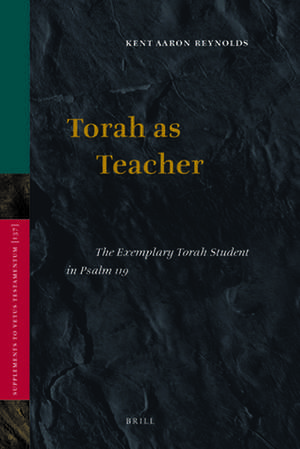Torah as Teacher: The Exemplary Torah Student in Psalm 119: Vetus Testamentum, Supplements, cartea 137
Autor Kent Reynoldsen Limba Engleză Hardback – 17 mai 2010
Din seria Vetus Testamentum, Supplements
- 18%
 Preț: 589.32 lei
Preț: 589.32 lei -
 Preț: 385.34 lei
Preț: 385.34 lei - 15%
 Preț: 442.91 lei
Preț: 442.91 lei - 18%
 Preț: 1041.14 lei
Preț: 1041.14 lei - 18%
 Preț: 1251.05 lei
Preț: 1251.05 lei - 18%
 Preț: 672.55 lei
Preț: 672.55 lei - 18%
 Preț: 789.13 lei
Preț: 789.13 lei - 18%
 Preț: 678.16 lei
Preț: 678.16 lei - 18%
 Preț: 697.73 lei
Preț: 697.73 lei - 18%
 Preț: 701.07 lei
Preț: 701.07 lei - 18%
 Preț: 935.18 lei
Preț: 935.18 lei - 18%
 Preț: 941.26 lei
Preț: 941.26 lei -
 Preț: 388.70 lei
Preț: 388.70 lei - 18%
 Preț: 815.58 lei
Preț: 815.58 lei - 18%
 Preț: 733.05 lei
Preț: 733.05 lei - 18%
 Preț: 861.50 lei
Preț: 861.50 lei - 18%
 Preț: 1132.70 lei
Preț: 1132.70 lei - 18%
 Preț: 1444.26 lei
Preț: 1444.26 lei - 18%
 Preț: 908.33 lei
Preț: 908.33 lei - 18%
 Preț: 908.81 lei
Preț: 908.81 lei - 18%
 Preț: 871.90 lei
Preț: 871.90 lei - 18%
 Preț: 586.66 lei
Preț: 586.66 lei - 18%
 Preț: 718.29 lei
Preț: 718.29 lei - 15%
 Preț: 446.99 lei
Preț: 446.99 lei - 18%
 Preț: 648.09 lei
Preț: 648.09 lei - 18%
 Preț: 717.98 lei
Preț: 717.98 lei - 18%
 Preț: 717.71 lei
Preț: 717.71 lei - 18%
 Preț: 1075.95 lei
Preț: 1075.95 lei - 18%
 Preț: 1099.61 lei
Preț: 1099.61 lei - 18%
 Preț: 680.59 lei
Preț: 680.59 lei - 18%
 Preț: 742.42 lei
Preț: 742.42 lei - 18%
 Preț: 972.62 lei
Preț: 972.62 lei - 18%
 Preț: 894.13 lei
Preț: 894.13 lei - 18%
 Preț: 1268.13 lei
Preț: 1268.13 lei -
 Preț: 207.94 lei
Preț: 207.94 lei - 18%
 Preț: 1216.75 lei
Preț: 1216.75 lei - 18%
 Preț: 1288.92 lei
Preț: 1288.92 lei - 18%
 Preț: 722.37 lei
Preț: 722.37 lei - 18%
 Preț: 1172.26 lei
Preț: 1172.26 lei - 18%
 Preț: 707.31 lei
Preț: 707.31 lei - 18%
 Preț: 712.96 lei
Preț: 712.96 lei - 18%
 Preț: 1044.37 lei
Preț: 1044.37 lei - 18%
 Preț: 873.75 lei
Preț: 873.75 lei -
 Preț: 370.61 lei
Preț: 370.61 lei - 18%
 Preț: 1605.69 lei
Preț: 1605.69 lei - 18%
 Preț: 646.83 lei
Preț: 646.83 lei - 18%
 Preț: 930.08 lei
Preț: 930.08 lei - 18%
 Preț: 816.77 lei
Preț: 816.77 lei - 18%
 Preț: 1045.94 lei
Preț: 1045.94 lei
Preț: 706.92 lei
Preț vechi: 862.10 lei
-18% Nou
Puncte Express: 1060
Preț estimativ în valută:
135.28€ • 141.41$ • 114.32£
135.28€ • 141.41$ • 114.32£
Carte indisponibilă temporar
Doresc să fiu notificat când acest titlu va fi disponibil:
Se trimite...
Preluare comenzi: 021 569.72.76
Specificații
ISBN-13: 9789004182684
ISBN-10: 9004182683
Pagini: 249
Dimensiuni: 155 x 235 x 23 mm
Greutate: 0.61 kg
Editura: Brill
Colecția Brill
Seria Vetus Testamentum, Supplements
ISBN-10: 9004182683
Pagini: 249
Dimensiuni: 155 x 235 x 23 mm
Greutate: 0.61 kg
Editura: Brill
Colecția Brill
Seria Vetus Testamentum, Supplements
Cuprins
Acknowledgments
Abbreviations
Translation
Chapter One Introduction
1.1. Introduction
1.2. Poetics
1.2.1. The Relationship between Form and Function
1.2.2. Structure or Progression in Addition to the Acrostic Form
1.3. Genre
1.3.1. A Lament Psalm?
1.3.2. A Wisdom Psalm?
1.3.3. A Torah Psalm?
1.3.4. An Anthological Psalm?
1.3.5. Conclusion
Chapter Two The Use of Traditional Religious Language
2.1. Introduction
2.2. The Language of Piety
2.2.1. Clinging to Torah—דבק
2.2.2. Trusting in Torah—בטח
2.2.3. Hoping in Torah—יחל
2.2.4. Believing in Torah—אמן
2.2.5. Loving Torah—אהב
2.2.6. Fearing Torah—ירא
2.2.7. Seeking Torah—דרש
2.2.8. Setting Torah Before Me
2.2.9. Raising My Hands to Torah
2.3. The Language of Lament
2.3.1. Petitions
2.3.2. Enemies
2.3.3. Claims of Innocence
2.3.4. Adaptations
2.4. The Language of Wisdom Literature
2.4.1. Locutions Borrowed from Wisdom Literature
2.4.2. Metaphors and Motifs that are Characteristic of Wisdom Literature
Chapter Three The Exemplary Torah Student
3.1. Introduction
3.2. Exemplary Types
3.2.1. The Righteous in Psalms
3.2.2. David
3.2.3. Exemplary Women in Proverbs
3.2.4. The Wise in Proverbs
3.2.5. The Suasive Force of Exemplary Types
3.3. The Portrayal of the Exemplary Torah Student—Its Construction
3.3.1. The Introductory Function of Verses 1–3
3.3.2. The Use of First-person Language
3.3.3. The Language of Devotion
3.3.3.1. Adverbial Phrases
3.3.3.2. Verbs of Emotion
3.3.3.3. The Speaker’s Relationship with God
3.3.4. The Language of Distress
3.3.4.1. Repeated Petitions
3.3.4.2. Enemies as a Foil
3.3.4.3. The Speaker’s Longing for Torah
3.3.5. The Language of Character Formation
3.3.6. Inconsistencies in the Portrayal
3.3.7. The Portrayal of Settings
3.3.8. Repetition
3.4. The Portrayal of the Exemplary Torah Student—Its Suasive Force
3.4.1. Advantages and Benefits of Torah Observance
3.4.2. A Secondary Function of Traditional Religious Language
3.4.3. The Suasive Force of Logical Gaps
Chapter Four The Concept of Torah
4.1. Introduction
4.2. What Psalm 119 Expresses
4.2.1. The Torah Terms
4.2.1.1. Excursus—עדות
4.2.1.2. Instantiations and an Abstract Concept
4.2.1.3. Interchangeable Usage?
4.2.1.4. “According to Your Word”— כדברך
4.2.1.5. “Word”— אמרה
4.2.1.6. “Regulations”— משפטים
4.2.2. Attributes of Torah
4.2.3. Torah Study
4.3. What Psalm 119 Does Not Express
4.3.1. Concepts that are Avoided
4.3.2. The Relationship Between Torah and Wisdom
4.3.3. Torah as a Hypostasis?
4.4. A Concept that is Greater than the Sum of the Parts
4.4.1. Definition
4.4.2. Evidence that the Concept is Greater than the Sum of the Parts
Chapter Five Psalm 119 in Context
5.1. Introduction
5.2. The Place of Psalm 119 in the Psalter
5.2.1. The Problem of Integrating Psalm 119 into the Structure of the Psalter
5.2.2. The Frequency and Placement of the Theme of Torah in the Psalter
5.2.3. Zenger’s Proposal
5.2.4. Psalm 119’s Contribution to the Theology of the Psalter
5.3. The Place of Psalm 119 in the Hebrew Bible
5.4. The Place of Psalm 119 in Developing Judaism
Conclusion
Commentary
Bibliography
Index of References
Author Index
Subject Index
